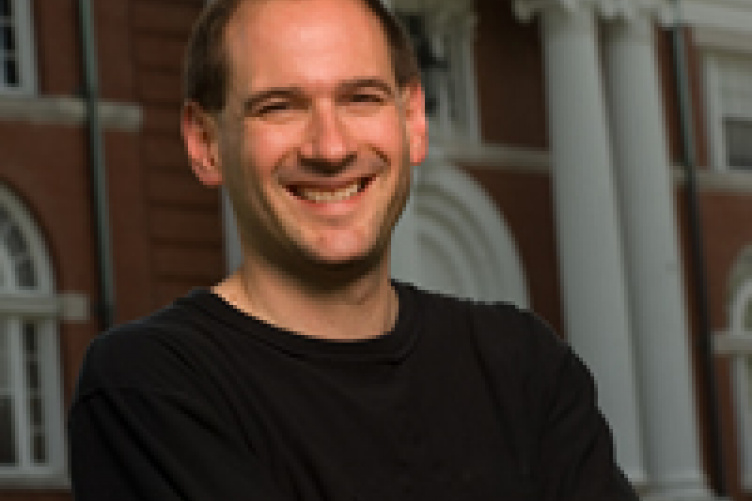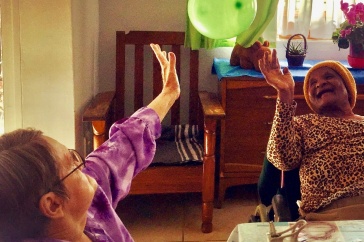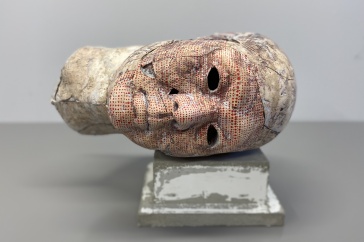
While theater may be one of our most ancient forms of human artistic expression, David Kaye's latest project was anything but old-fashioned. Kaye teamed up with N.B. Aldrich and the University of Maine's Intermedia MFA program to present "eStranged," a 21st-century response to Albert Camus's "The Stranger."
Originally published in 1942, the novel explores themes of existential philosophy, societal systems of control, and alienation. "We are arguing that the systems of control that Camus discussed have shifted to the Internet," said Kaye, co-author and co-director.
But what made this already fascinating topic truly revolutionary was the way in which the play was presented. Two separate audiences viewed two groups of actors via a live feed. This new approach, known as a "telematic performance," is a form that allows artists to overcome traditional geographical limitations through the use of communications technology. By viewing projections of the actors on monitors, the audiences were able to see a work that formed a cohesive whole.
Fewer than ten telematic performances have been displayed internationally, and Kaye's project was in development for two years. Rehearsal proved to be both exciting and challenging for this production, which debuted on November 20, 2013. Because technology was essential to the storytelling, the necessary equipment needed to be set-up and synched before the actors and crew could begin work. However, the realization of a new form of theater that can link a human audience across a geographic space is a goal that Kaye and his colleagues have been thrilled to pursue.
Kaye's other projects include directing both inside and outside the university. In a typical year, Kaye will direct one play for UNH and two works for separate production companies. Recently, he worked with Maine-based actress and author Susan Poulin to direct her one-woman show, "I Married An Alien." He presents regularly at national conferences, sharing research on a broad range of topics including acting, directing, applied theater, and social justice. Two years ago, Kaye co-developed and directed "Bloodshed, Deliverance, Miracles, Good Food!" which had its premiere at the Theatronetto Festival in Tel Aviv before going on to performances in Haifa and New York City. The piece was created while he was in Israel as a Fulbright Scholar. He is currently developing a new play, "How I Brought Peace to the Middle East," based on his Fulbright experience.
Kaye's work is far from limited to the "traditional" realm of performance art and the humanities. Applied theater, which Kaye describes as "acting for non-actors," utilizes theater models and pedagogy (the science and art of education) to improve communication, address social issues, resolve conflict, and encourage professional and community development. He utilizes the work of Augusto Boal, who described these types of exercises as "rehearsal for the future." In collaboration with UNH's Carsey Institute, NH Listens (a UNH-based facilitation service), Kaye has organized an applied theater project to help develop the skills of people who facilitate public meetings. In June 2013, Kay and his theatre group, Powerplay Interactive Development, helped facilitation experts from UNH Cooperative Extension use this approach to practice new strategies for navigating difficult or contentious community conversations (pictured at right).
Currently, Kaye is working with UNH's ADVANCE program to tackle the topic of gender bias in the fields of science, technology, engineering, and mathematics (STEM). The audiences for these performances are made up of university professors in STEM, administrators, and other educators from departments across UNH. Each scenario is staged with actors and begins with a pre-planned scene about fifteen minutes in length. This sketch models the behavior of a university hiring committee and ultimately results in an unsatisfactory outcome. The action is paused at various points, and the audience is encouraged to ask questions of the involved characters. After a discussion, audience members have the opportunity to "rewrite" the scenario, either telling the actors how to perform or, if they feel inclined, jumping into the performance to participate.
Kaye explained that this activity helps participants articulate how gender bias functions in hiring situations. By witnessing a physical display of the action, the audience is able to break down the behavior. Kaye has seen professors become captivated by the opportunity provided by this outlet, which accommodates a trial of various techniques in a setting with peers.
Kaye's work breaks new artistic ground while also providing rich opportunities for the University community. Whether he is combining computers and Camus or facilitating a dialogue on the social issues that define the modern human experience, Kaye's passion and expertise is a great resource for the world of theater and UNH.




















































